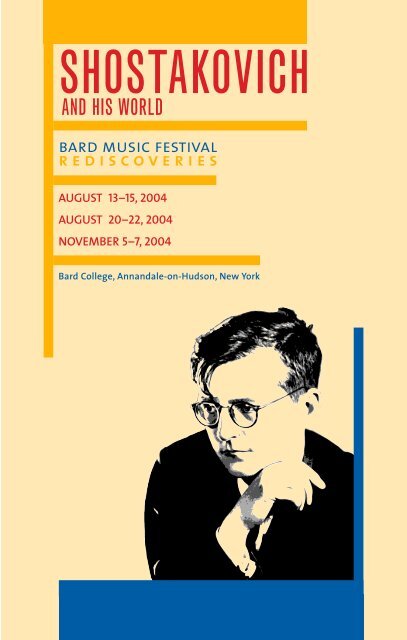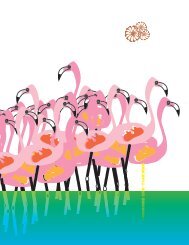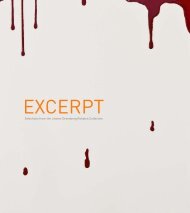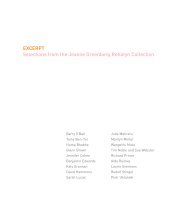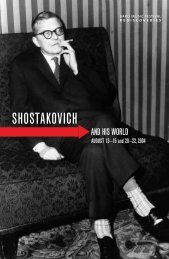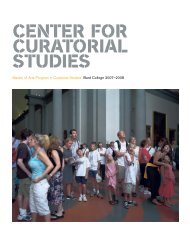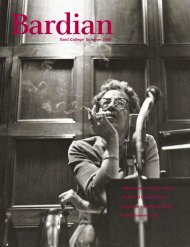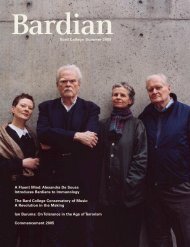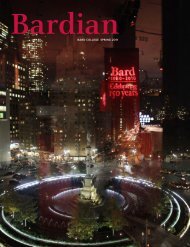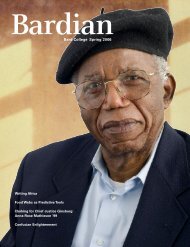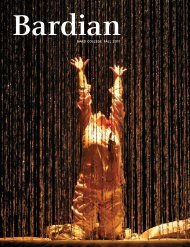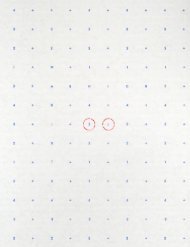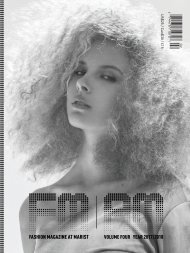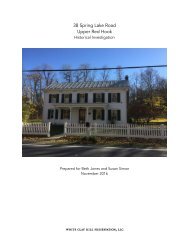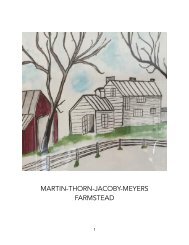BMF SHOSTAKOVICH Brochure 04
Create successful ePaper yourself
Turn your PDF publications into a flip-book with our unique Google optimized e-Paper software.
<strong>SHOSTAKOVICH</strong><br />
AND HIS WORLD<br />
bard music festival<br />
rediscoveries<br />
AUGUST 13–15, 20<strong>04</strong><br />
AUGUST 20–22, 20<strong>04</strong><br />
NOVEMBER 5–7, 20<strong>04</strong><br />
Bard College, Annandale-on-Hudson, New York
<strong>SHOSTAKOVICH</strong><br />
1906–1975<br />
The life and work of Dmitrii Shostakovich are inextricably entwined with<br />
the central questions of politics and culture in the 20th century. His<br />
music represents a challenge to listeners that is unique in the annals of<br />
concert music, in part because of the compelling power of his greatest<br />
works and the tremendous divergences in its reception. The qualities of<br />
the music and its historical contexts have given rise to highly contested<br />
interpretations. More than a quarter-century after his death, however,<br />
Shostakovich has emerged as one of the most influential and popular<br />
composers of the 20th century.<br />
Born in 1906, Shostakovich experienced World War I and the October<br />
Revolution. He participated in the progressive era in the arts of the<br />
1920s. Intensely ambitious and talented as a pianist and composer, he<br />
maintained a complex relationship with the Soviet regime from Stalin<br />
to Brezhnev. In the post-Stalin era, Shostakovich became celebrated in<br />
the West and, in the bilateral world of the Cold War, took on more and<br />
more the aspect of an official representative of Soviet music. In the<br />
1950s and 1960s he was championed, partly in the name of peaceful<br />
coexistence and partly because his music seemed to convey emotional<br />
intensity, along with a connection to tradition seemingly absent from<br />
the music of radical modernism and the avant-garde in Western Europe<br />
and America. In the final stage of Shostakovich’s life, his relationship to<br />
the Soviet regime became extremely painful. In ill health, he distanced<br />
himself from the ever-growing number of dissidents and continued to<br />
sustain his role as the preeminent Soviet composer.<br />
There is little doubt that Shostakovich suffered intensely in the pursuit<br />
of his life as a composer within the constraints of Soviet Russia, above<br />
and beyond the predictable internal struggle that may be generic to the<br />
creative artist. Despite the undeniable fact that in the massive output<br />
of music he wrote there are masterpieces in practically every genre<br />
(including popular song and film music), the controversy over the meaning<br />
and significance of Shostakovich’s music has not subsided since his<br />
death. Not only has there been the predictable rush to interpretive revisionism<br />
typical of many posthumous assessments, but debate has continued<br />
about Shostakovich’s significance and influence, heightened by<br />
the collapse of communism and the concomitant decline in the fortunes<br />
of musical modernism. He has taken a permanent place as a towering<br />
and strangely characteristic seminal figure in 20th-century culture,<br />
inclusive of its politics and social history. The reasons for this are as<br />
complicated as the matter of understanding the composer himself.<br />
Shostakovich’s significance as a composer cannot be reduced to some<br />
narrative about the triumph of conservatism and the demise of an avantgarde.<br />
The symphonies, chamber music, and vocal and operatic music<br />
have, from their introduction to both Russian and Western audiences,<br />
communicated alienation, affirmation, intimacy, and beauty, as well as<br />
the fissures and contradictions of modern life.<br />
The Bard Music Festival will attempt to confront and untangle the strands<br />
in the music of Shostakovich, the personality of the composer, the politics<br />
of his career, and the posthumous reception of his work. The Princeton<br />
University Press volume, edited by Laurel E. Fay, America’s leading<br />
Shostakovich scholar, and the symposium, panels, and preconcert lectures<br />
over the three weekends of orchestral and chamber performances and<br />
the additional two weeks of opera performances will provide an overview<br />
of his music. The repertoire will include not only those works that have<br />
always had a following in the West and appear to be representative, but<br />
also lesser-known works. Included will be examples of music that those<br />
who wish to portray Shostakovich as a lifelong dissident might wish to<br />
forget, works of patriotism and propaganda that suggest little hint of<br />
contradiction. As is the custom at the Bard Music Festival, Shostakovich’s<br />
music will be placed alongside that of his contemporaries in Russia.<br />
Photos: cover, from Dmitry Shostakovich Composer, Foreign Languages Publishing, Moscow, 1959; this page, ©Bettman/CORBIS<br />
Although Shostakovich’s career as an opera composer was dramatically<br />
changed by Stalin’s reaction to Lady Macbeth of the Mtsensk District,<br />
written when the composer was still a young man, his music for the<br />
stage is still some of his best, and reveals indispensable aspects of his<br />
genius. The Richard B. Fisher Center for the Performing Arts, the new<br />
home of the Bard Music Festival, will stage The Nose, the opera based on<br />
the story by Gogol and first staged in 1930.
OPERA<br />
The Nose<br />
An opera in three acts by Dmitrii Shostakovich<br />
Based on the story by Nikolai Gogol<br />
(in Russian, with English surtitles)<br />
richard b. fisher center for the performing arts, sosnoff theater<br />
JULY 28 – AUGUST 7<br />
The American Symphony Orchestra, conducted by Leon Botstein, music director<br />
Francesca Zambello, director<br />
Rafael Viñoly, scenic designer<br />
Georgi Alexi-Meskhishvili, costume designer<br />
Mark McCullough, lighting designer<br />
WEEKEND<br />
ONE<br />
FRIDAY<br />
AUGUST 13<br />
program one DMITRII <strong>SHOSTAKOVICH</strong>:<br />
THE MAN AND HIS WORK<br />
Dmitrii Shostakovich (1906–75): Funeral March, “In Memory of the<br />
Victims of the Revolution” (1917); Three Fantastic Dances, Op. 5,for<br />
piano (1920); from Twenty-four Preludes and Fugues, Op. 87 (1950–51);<br />
Songs; Piano Trio No. 2 in E Minor, Op. 67 (1944); Suite for Jazz<br />
Orchestra No. 1 in E Major (1934); String Quartet No. 11 in F Minor,<br />
Op. 122 (1966)<br />
richard b. fisher center for the performing arts<br />
sosnoff theater<br />
8:00 p.m. Preconcert Talk Leon Botstein<br />
8:30 p.m. Performance Andrey Antonov, bass; Bard Festival String<br />
Quartet; Claremont Trio; Anna Polonsky, piano; Lauren Skuce, soprano;<br />
Dénes Várjon, piano; Bard Festival Chamber Players<br />
SATURDAY<br />
panel one CONTESTED ACCOUNTS: AUGUST 14<br />
THE COMPOSER’S LIFE AND CAREER<br />
Leon Botstein, moderator; Laurel E. Fay; Elizabeth Wilson;<br />
others TBA<br />
olin hall<br />
10:00 a.m. – noon<br />
program two THE FORMATIVE YEARS<br />
Dmitrii Shostakovich (1906–75): Two Fables of Krylov,Op.4 (1922);<br />
Trio No. 1 in C Minor, Op. 8 (1923); Prelude and Scherzo, Op. 11, for<br />
string octet (1924)<br />
Igor Stravinsky (1882–1971): Three Pieces for String Quartet (1914)<br />
Aleksandr Glazunov (1865–1936): From Four Preludes and Fugues,<br />
Op. 101 (1918–23)<br />
Sergey Prokofiev (1891–1953): Piano Sonata No. 3 in A Minor, Op. 28,<br />
“From Old Notebooks” (1917)<br />
Aleksandr Skriabin (1872–1915): Piano Sonata No. 9, Op. 68,<br />
“Black Mass”(1912–13)<br />
Mikhail Gnesin (1883–1953): Songs of a Knight Errant,Op.28 (1928)<br />
© Georgi Alexi-Meskhishvili
Maximilian Shteynberg (1883–1946): Four Songs on Texts by<br />
Rabindranath Tagore, Op. 14 (1924)<br />
olin hall<br />
1:00 p.m. Preconcert Talk Robert Martin<br />
1:30 p.m. Performance Bard Festival String Quartet; Claremont Trio;<br />
Colorado String Quartet; William Ferguson, tenor; Jessie Hinkle,<br />
mezzo-soprano; Dénes Várjon, piano; others TBA<br />
Aram Khachaturian (1903–78): Trio for clarinet, violin, and piano (1932)<br />
Ivan Dzerzhinsky (1909–78): Excerpts from The Quiet Don (1934)<br />
Tikhon Khrennikov (b. 1913): Excerpts from Into the Storm (1936–39)<br />
richard b. fisher center for the performing arts<br />
sosnoff theater<br />
4:30 p.m. Preconcert Talk Marina Frolova-Walker<br />
5:00 p.m. Performance Zuill Bailey, cello; Bard Festival String Quartet;<br />
Simone Dinnerstein, piano; John Hancock, baritone; others TBA<br />
program three FROM SUCCESS TO DISGRACE<br />
Dmitrii Shostakovich (1906–75): Theme and Variations in B-flat Major,<br />
Op. 3 (1921–22); Symphony No. 1 in F Minor, Op. 10 (1923–25); Symphony<br />
No. 4 in C Minor, Op. 43 (1935–36)<br />
richard b. fisher center for the performing arts<br />
sosnoff theater<br />
7:00 p.m. Preconcert Talk Morten Solvik<br />
8:00 p.m. Performance American Symphony Orchestra, Leon Botstein,<br />
conductor<br />
SUNDAY<br />
AUGUST 15<br />
panel two MUSIC IN THE SOVIET UNION<br />
Christopher H. Gibbs, moderator; Marina Frolova-Walker; others TBA<br />
olin hall<br />
10:00 a.m. – noon<br />
program four THE PROGRESSIVE 1920s<br />
Dmitrii Shostakovich (1906–75): Piano Sonata No. 1,Op.12 (1926);<br />
Aphorisms, Op. 13 (1927)<br />
Vladimir Shcherbachov (1889–1952): Songs, Op. 11 (1915–24)<br />
Nikolay Myaskovsky (1881–1950): String Quartet No. 4,Op.33,No.4<br />
(1909–37)<br />
Gavriil Popov (19<strong>04</strong>–72): Septet, Op. 2 (1927)<br />
olin hall<br />
1:00 p.m. Preconcert Talk Simon Morrison<br />
1:30 p.m. Performance Courtenay Budd, soprano; Melvin Chen, piano;<br />
Colorado String Quartet; Bard Festival Chamber Players<br />
program five THE ONSET OF POLITICAL REACTION<br />
Dmitrii Shostakovich (1906–75): Cello Sonata in D Minor, Op. 40 (1934);<br />
Four Romances, Op. 46 (1936–37); Oath to the People’s Commissar (1941)<br />
Vissarion Shebalin (1902–63): String Quartet No. 5,Op.33,<br />
“Slavonic” (1942)<br />
Dmitrii Kabalevsky (19<strong>04</strong>–87): Sonatina No. 1,Op.13,No.1, for piano (1930)<br />
WEEKEND<br />
TWO<br />
FRIDAY<br />
symposium ART AND CULTURE IN THE SOVIET ERA AUGUST 20<br />
Paul Mitchinson, moderator; Jonathan Brent; Caryl Emerson;<br />
Steven Marks; Joan Neuberger; Richard Pipes; Jane Sharp<br />
olin hall<br />
10:00 a.m. – noon<br />
1:30 p.m. – 3:30 p.m.<br />
program six “GOOD MORNING MOSCOW”:<br />
ONE DAY IN THE LIFE OF<br />
SOVIET POPULAR MUSIC<br />
Radio was the lifeline to the outside world as well as the main<br />
provider of entertainment for many living under the Soviet regime.<br />
This program, conceived and scripted by Marina Kostalevsky, explores<br />
the popular music of the time as it was heard, and integrated into<br />
daily life, by the inhabitants of communal apartments in Moscow.<br />
richard b. fisher center for the performing arts<br />
sosnoff theater<br />
8:00 p.m. Performance<br />
Tatiana Bruni, 1931, drawings for<br />
The Bolt, © St. Petersburg State<br />
Museum of Theatre and Music
SATURDAY<br />
AUGUST 21<br />
program seven MUSIC AS POLITICS<br />
Dmitrii Shostakovich (1906–75): Rayok (Little Paradise)<br />
(1948, 1965–68); with Nikita Storojev, bass<br />
olin hall<br />
10:00 a.m. Performance with commentary by Richard Taruskin<br />
program eight IN THE SHADOW OF 1948<br />
Dmitrii Shostakovich (1906–75): From Twenty-four Preludes and Fugues,<br />
Op. 87 (1950–51); String Quartet No. 5 in B-flat Major, Op. 92 (1953)<br />
Galina Ustvolskaya (b. 1919): Trio for clarinet, violin, and piano (1949)<br />
Mieczyslaw Weinberg (1919–96): Moldavian Rhapsody, Op. 47,No.3,for<br />
violin and piano (1949–52)<br />
Works by Georgy Sviridov (1915–98) and Yury Shaporin (1887–1966)<br />
olin hall<br />
1:00 p.m. Preconcert Talk David Fanning<br />
1:30 p.m. Performance Chiara String Quartet; Alexander Fiterstein,<br />
clarinet; Alon Goldstein, piano; Martin Kasik, piano; Philippe Quint, violin<br />
program nine AFTER THE THAW:<br />
A COMPOSER LOOKS BACK<br />
Dmitrii Shostakovich (1906–75): The Execution of Stepan Razin,Op.119<br />
(1964); Symphony No. 14,Op.135 (1969)<br />
Modest Musorgsky (1839–81): Songs and Dances of Death (1875–77;<br />
arr. Shostakovich, 1962)<br />
richard b. fisher center for the performing arts<br />
sosnoff theater<br />
Boris Tishchenko (b. 1939): String Quartet No. 1,Op.8 (1957)<br />
Sofiya Gubaidulina (b. 1931): Five Etudes (1965)<br />
Alfred Schnittke (1934–98): From Four Hymns for Cello and<br />
Instrumental Ensemble (1974–77)<br />
olin hall<br />
1:00 p.m. Preconcert Talk Peter Schmelz<br />
1:30 p.m. Performance Lydia Artymiw, piano; Courtenay Budd, soprano;<br />
Chiara String Quartet; Kim Kashkashian, viola; Bard Festival Chamber<br />
Players<br />
program eleven IDEOLOGY AND INDIVIDUALISM<br />
Dmitrii Shostakovich (1906–75): Sun over Our Homeland, Cantata,<br />
Op. 90 (1952); The Song of the Forests,Op.81 (1949); Symphony No. 10<br />
in E Minor, Op. 93 (1953)<br />
richard b. fisher center for the performing arts<br />
sosnoff theater<br />
4:00 p.m. Preconcert Talk Christopher H. Gibbs<br />
5:00 p.m. Performance Simon O’Neill, tenor; Valerian Ruminski, bass;<br />
Bard Festival Chorale, James Bagwell, choral director; American<br />
Symphony Orchestra, Leon Botstein, conductor<br />
7:00 p.m. Preconcert Talk Laurel E. Fay<br />
8:00 p.m. Performance Ewa Podleś, contralto; Lauren Skuce, soprano;<br />
Nikita Storojev, bass; Bard Festival Chorale, James Bagwell, choral<br />
director; American Symphony Orchestra, Leon Botstein, conductor<br />
SUNDAY<br />
panel three THE COMPOSER’S LEGACY: AUGUST 22<br />
<strong>SHOSTAKOVICH</strong> IN THE CONTEXT<br />
OF MUSIC TODAY<br />
Richard Wilson, moderator; others TBA<br />
olin hall<br />
10:00 a.m. – noon<br />
program ten A NEW GENERATION RESPONDS<br />
Dmitrii Shostakovich (1906–75): Viola Sonata, Op. 147 (1975)<br />
Edison Denisov (1929–96): The Sun of the Incas (1964)<br />
WEEKEND<br />
THREE<br />
FRIDAY<br />
NOVEMBER 5<br />
Battleship Potemkin, film poster<br />
by Stenberg Brothers 1929.<br />
© Swim Ink/CORBIS<br />
program one WORLD WAR II AND ITS AFTERMATH<br />
Dmitrii Shostakovich (1906–75): From Jewish Folk Poetry, Op. 79a<br />
(1948–?64); Symphony No. 7 in C Major, Op. 60, “Leningrad” (1941)<br />
richard b. fisher center for the performing arts, sosnoff theater<br />
7:00 p.m. Preconcert Talk<br />
8:00 p.m. Performance American Symphony Orchestra,<br />
Leon Botstein, conductor; others TBA
SATURDAY<br />
panel ART IN WARTIME NOVEMBER 6<br />
Participants TBA<br />
olin hall<br />
10:00 a.m. – noon<br />
program two ELECTIVE AFFINITIES:<br />
A MUSICAL AND SPIRITUAL FRIENDSHIP<br />
Dmitrii Shostakovich (1906–75): String Quartet No. 2 in A Major,<br />
Op. 68 (1944); String Quartet No. 3 in F Major, Op. 73 (1946)<br />
Benjamin Britten (1913–76): String Quartet No. 2 in C Major,<br />
Op. 36 (1945)<br />
richard b. fisher center for the performing arts<br />
sosnoff theater<br />
1:00 p.m. Preconcert Talk<br />
1:30 p.m. Performance Emerson String Quartet<br />
program three WORLD WAR II AND ITS AFTERMATH<br />
Dmitrii Shostakovich (1906–75): From Jewish Folk Poetry, Op. 79a<br />
(1948–?64); Symphony No. 7 in C Major, Op. 60, “Leningrad” (1941)<br />
richard b. fisher center for the performing arts<br />
sosnoff theater<br />
7:00 p.m. Preconcert Talk<br />
8:00 p.m. Performance American Symphony Orchestra,<br />
Leon Botstein, conductor; others TBA<br />
SUNDAY<br />
NOVEMBER 7<br />
program four MUSIC AND WORLD WAR II<br />
Works by Dmitrii Shostakovich (1906–75), Sergey Prokofiev (1891–1953),<br />
Mieczyslaw Weinberg (1919–96), and Georgy Sviridov (1915–98)<br />
richard b. fisher center for the performing arts<br />
sosnoff theater<br />
11:00 a.m. Preconcert Panel: “The Fall of Berlin”<br />
2:00 p.m. Performance<br />
THE BARD MUSIC FESTIVAL<br />
The Bard Music Festival was founded in 1990 to promote new ways of understanding and<br />
presenting the history of music to a contemporary audience. Each year, a single composer is<br />
chosen as the main subject. The biography of the composer, the influences and consequences<br />
of that composer’s achievement, and all aspects of the musical culture surrounding the time<br />
and place of the composer’s life are explored. By linking music to the worlds of literature,<br />
painting, theater, philosophy, and politics, the festival brings two kinds of audiences together:<br />
those with a long history of interest in concert life, and first-time listeners, who find the festival<br />
an ideal place to learn about and enjoy the riches of our musical past.<br />
The festival also seeks to bridge the worlds of performance and scholarship in new and<br />
exciting ways. As a result of this collaboration, each concert is curated and the concert format<br />
varies, so that different genres and instrumental groupings appear in a single program, breaking<br />
the mold of the standard vocal recital, piano recital, or quartet concert. The festival’s tradition<br />
of presenting concert operas was replaced by performances of staged operas, made possible by<br />
the opening of The Richard B. Fisher Center for the Performing Arts at Bard College in 2003.<br />
Princeton University Press will again publish a book of new scholarship and interpretation<br />
as well as documents, many previously unavailable in English. This year’s volume,<br />
Shostakovich and His World, the 15th in the series, is edited by Laurel E. Fay.<br />
Leon Botstein, Christopher H. Gibbs, and Robert Martin, Artistic Directors<br />
Laurel E. Fay, Scholar-in-Residence 20<strong>04</strong><br />
FESTIVAL PERFORMERS<br />
Andrey Antonov, bass; Lydia Artymiw, piano; Zuill Bailey, cello; Bard Festival String Quartet;<br />
Courtenay Budd, soprano; Melvin Chen, piano; Chiara String Quartet; Claremont Trio; Colorado<br />
String Quartet; Simone Dinnerstein, piano; William Ferguson, tenor; Alexander Fiterstein,<br />
clarinet; Alon Goldstein, piano; John Hancock; baritone; Jessie Hinkle, mezzo-soprano; Kim<br />
Kashkashian, viola; Martin Kasik, piano; Marina Kostalevsky, author; Simon O’Neill, tenor; Ewa<br />
Podleś, contralto; Anna Polonsky, piano; Philippe Quint, violin; Valerian Ruminski, bass; Lauren<br />
Skuce, soprano; Nikita Storojev, bass; Dénes Várjon, piano; Bard Festival Chamber Players; Bard<br />
Festival Chorale, James Bagwell, choral director; American Symphony Orchestra, Leon Botstein,<br />
music director<br />
LECTURERS AND PANELISTS<br />
Leon Botstein, Bard College; Jonathan Brent,Yale University; Caryl Emerson, Princeton University;<br />
David Fanning, University of Manchester; Laurel E. Fay; Marina Frolova-Walker, University of<br />
Cambridge; Christopher H. Gibbs, Bard College; Steven Marks, Clemson University; Robert<br />
Martin, Bard College; Paul Mitchinson; Simon Morrison, Princeton University; Joan Neuberger,<br />
University of Texas, Austin; Richard Pipes, Harvard University; Peter Schmelz, SUNY at Buffalo;<br />
Jane Sharp, Rutgers University; Morten Solvik, Institute of European Studies, Vienna; Richard<br />
Taruskin, University of California, Berkeley; Elizabeth Wilson; Richard Wilson, Vassar College<br />
All programs and artists are subject to change.
BARDSUMMERSCAPE 20<strong>04</strong><br />
PROGRAM SCHEDULE<br />
JULY 2 – AUGUST 22<br />
THE RICHARD B. FISHER CENTER<br />
FOR THE PERFORMING ARTS<br />
AT BARD COLLEGE<br />
OPERA<br />
THEATER<br />
The Nose JULY 28 – AUGUST 7<br />
by Dmitrii Shostakovich<br />
Libretto by the composer, Yevgeny Zamyatin,<br />
Georgy Ionin, and Alexander Preys, after the story by Gogol<br />
The American Symphony Orchestra<br />
Conducted by Leon Botstein, music director<br />
Directed by Francesca Zambello<br />
The Inspector General JULY 8–11<br />
A play by Nikolai Gogol<br />
The Alexandriinsky Theater of St. Petersburg<br />
Directed by Valery Fokin<br />
Music by Leonid Desatnikov<br />
The Overcoat AUGUST 4–8<br />
Based on a story by Nikolai Gogol<br />
Credo Theatre of Bulgaria<br />
Nevsky Prospekt AUGUST 11–15<br />
Based on a story by Nikolai Gogol<br />
Theatre Potudan of St. Petersburg<br />
MUSIC<br />
THEATER<br />
RUSSIAN<br />
FILM FESTIVAL<br />
NIGHTSCAPE<br />
CABARET<br />
Guest from the Future JULY 22 – AUGUST 1<br />
Music by Mel Marvin<br />
Libretto by Jonathan Levi<br />
Directed by David Chambers<br />
Music directed by David Levi<br />
St. Petersburg Legacy JULY 24, 25<br />
Da Camera of Houston<br />
Directed by Sarah Rothenberg<br />
Moscow: Cherry Tree Towers AUGUST 12–15<br />
by Dmitrii Shostakovich<br />
Libretto by Vladimir Mass and Mikhail Chervinsky<br />
Directed by Francesca Zambello<br />
Music directed by Sergei Dreznin<br />
SummerScape 20<strong>04</strong>’s Russian Film<br />
Festival includes four films scored by<br />
Dmitrii Shostakovich, including his great<br />
Shakespeare collaborations with director<br />
Grigory Kozintsev, Hamlet and King Lear.<br />
Also to be screened are films by acclaimed<br />
animator Yuri Norstein, including his uncompleted<br />
version of The Overcoat, along with other rare<br />
cinematic treatments of classic stories by Nikolai<br />
Gogol and three recently discovered and restored<br />
film comedies by Boris Barnet.<br />
JULY 15 – AUGUST 21<br />
A late-night cabaret of informal JULY 10 – AUGUST 21<br />
entertainment Saturday evenings<br />
during the SummerScape season<br />
All programs and artists are subject to change.<br />
FOR DETAILED INFORMATION ON TIMES, TICKET PRICES, AND LOCATIONS,<br />
SEE TICKET FORM, CALL 845-758-7900, OR VISIT summerscape.bard.edu.<br />
© Georgi Alexi-Meskhishvili<br />
White Cabin AUGUST 18–21<br />
Akhe Russian Engineering Theatre of St. Petersburg
tickets<br />
Donors of $500 or more have the opportunity to purchase<br />
tickets prior to general sales, beginning April 8, 20<strong>04</strong>. Tickets<br />
go on sale to the general public on May 1, 20<strong>04</strong>.<br />
Discounts<br />
Discounted tickets will be marked by the box office and<br />
checked at the door. Discounts apply only to the individual<br />
for whom the ticket is purchased. Only one discount per<br />
ticket purchased is permitted. Single ticket discounts do not<br />
apply to subscriptions.<br />
Senior citizens aged 62 and over are eligible for a discount<br />
of $4 per single ticket purchased.<br />
Students aged 5 to 18 and college and graduate students<br />
with a valid school ID are eligible for a discount of $15 per<br />
single ticket purchased.<br />
Groups of 15 or more may be eligible for a discount. Please<br />
call the box office manager at 845-758-7948.<br />
Please Note<br />
Tickets will not be held without payment.<br />
No refunds or exchanges will be made on ticket sales.<br />
dining<br />
The new Manor House Café, steps away from the Fisher<br />
Center, features stunning views of the Catskills and superb<br />
cuisine. It is open weekdays from 11 am to 5 pm for lunch,<br />
snacks, and picnics. From 5 to 8 pm on performance days,<br />
Manor House serves a prix fixe four-course dinner at $35 per<br />
person, exclusive of beverages, tax, and tip. Call the box<br />
office at 845-758-7900 for reservations.<br />
other information<br />
Latecomers are not admitted to the hall after the performance<br />
has started. Closed-circuit TVs are available in the lobby<br />
of the Sosnoff Theater and Theater Two for patrons to view<br />
the performance. Ushers will direct patrons to their seats<br />
during a suitable pause, but this may not be until an intermission.<br />
Patrons who need to leave the hall during a performance<br />
will be readmitted only during a suitable pause.<br />
Children under age 5 may attend age-appropriate events<br />
only. Check with the box office. Infants will not be admitted<br />
to performances.<br />
The use of recording equipment or photography is strictly<br />
prohibited during performances.<br />
Mobile phones, beepers, and watch alarms must be turned<br />
off during performances.<br />
Lost and Found is in the box office in the Sosnoff Theater.<br />
If you have forgotten or lost your tickets, the box office can<br />
reprint them. Stop by the box office prior to the performance.<br />
Access and Facilities for the Disabled<br />
Seating in the Sosnoff Theater is available in all price categories<br />
for patrons in wheelchairs and their companions. See<br />
the seating chart for locations. There is an elevator to all levels<br />
of the Sosnoff Theater and a special wheelchair lift used<br />
to access front-row wheelchair seating.<br />
Wheelchair seating in Theater Two and Resnick Theater Studio<br />
varies for each production. Wheelchair seating in Olin Hall<br />
and the Film Center is in the front of the hall.<br />
Please be sure to let the box office know at the time you<br />
purchase your tickets that you need wheelchair seating so<br />
an appropriate location can be reserved for you.<br />
Restrooms in all locations are wheelchair accessible. For the<br />
additional convenience of Sosnoff Theater patrons, there is<br />
a private restroom on the lower lobby for use by patrons in<br />
wheelchairs.<br />
Sennheiser infrared assistive listening devices are available<br />
in the Sosnoff Theater and Theater Two. Receivers may be<br />
borrowed on request at the box office.<br />
Reserved parking is available for drivers with disabilities.<br />
Please call 845-758-7923 in advance to ensure a reserved<br />
space. Drivers of cars carrying the disabled are asked to drop<br />
their passengers off at the drop-off point in front of the<br />
Fisher Center.<br />
If you would like additional information or have any special<br />
requirements not covered in the brochure, please call 845-<br />
758-7945 for assistance.<br />
contributions<br />
The revenue from ticket sales does not cover the costs of<br />
producing the Bard Music Festival. You can help by making<br />
a gift in one of the categories listed below. With your support,<br />
we will continue to explore the life and work of the<br />
world’s leading composers and enjoy outstanding music<br />
every summer.<br />
Friend:$100 – $499<br />
Friends receive a contributor’s price on individual tickets for<br />
the Bard Music Festival, and their names are listed in the<br />
program. (Donation is fully tax deductible.)<br />
Sponsor:$500 – $999<br />
Sponsors receive the preceding benefits, a copy of the festival<br />
book, and a recording of Richard Strauss’s Die ägyptische<br />
Helena with Leon Botstein conducting. ($53 of donation is not<br />
tax deductible.)<br />
Patron:$1,000 – $2,499<br />
Patrons receive all of the preceding benefits, plus reserved<br />
parking for all Fisher Center performances, exclusive use of<br />
a special telephone line to purchase and reserve tickets, priority<br />
seating, and an invitation to a dinner at a Hudson River<br />
home during the festival. Patrons are also invited to postconcert<br />
receptions with musicians throughout the year. ($103<br />
of donation is not tax deductible.)<br />
Associate:$2,500 – $4,999<br />
Associates receive all of the preceding benefits, plus an invitation<br />
to the Bard Music Festival Board of Directors dinner<br />
on opening night of the festival. ($153 of donation is not tax<br />
deductible.)<br />
Benefactor:$5,000 and above<br />
Benefactors receive all of the preceding benefits, plus a pair<br />
of tickets to the Saturday night orchestra concert during<br />
the third weekend of the Bard Music Festival, November 6,<br />
20<strong>04</strong>, in the Sosnoff Theater at the Fisher Center, and invitations<br />
to special festival events scheduled throughout the<br />
year. Benefactors will also receive the opportunity to underwrite<br />
events. ($213 of donation is not tax deductible.)<br />
Special thanks to the Bettina Baruch Foundation, Richard B. and Jeanne<br />
Donovan Fisher, the Homeland Foundation, Mimi Levitt, Joanna M.<br />
Migdal, Andrea and Kenneth Miron, Mary and James H. Ottaway Jr.,<br />
Felicitas S. Thorne, and Margo and Anthony Viscusi for their outstanding<br />
support in underwriting this festival.<br />
travel to bard<br />
This project is also made possible in part by grant<br />
awards from the National Endowment for the Arts<br />
and the New York State Council on the Arts.<br />
Bard College is in Annandale-on-Hudson, New York, on the<br />
east bank of the Hudson River, about 90 miles north of New<br />
York City and 220 miles southwest of Boston.<br />
By Train<br />
Amtrak provides service from Penn Station, New York City, and<br />
from Albany to Rhinecliff,about 9 miles south of Annandale.Taxi<br />
service is available at the station.<br />
By Automobile<br />
From southern Connecticut, follow I-84 to the Taconic State<br />
Parkway; take the Taconic north to the Red Hook/Route 199<br />
exit; drive west on Route 199 through the village of Red<br />
Hook to Route 9G; turn right onto Route 9G and drive north<br />
1.9 miles. Follow the sign for Center for Performing Arts.<br />
From northern Connecticut, take Route 44 to Route 199 at<br />
Millerton; drive west on Route 199 and proceed as from<br />
southern Connecticut.<br />
From Massachusetts and northern New England, take the<br />
Massachusetts Turnpike to Exit B-2 (Taconic Parkway); take<br />
the Taconic south to the Red Hook/Route 199 exit and proceed<br />
as from southern Connecticut.<br />
From New York City, New Jersey, and points south, take the<br />
New York State Thruway to Exit 19 (Kingston); take Route<br />
209 (which changes to Route 199 at the Hudson River) over<br />
the Rhinecliff Bridge to Route 9G at the second light; turn<br />
left onto Route 9G and drive north 3.8 miles. Follow the sign<br />
for Center for Performing Arts.<br />
From Albany, take the New York State Thruway to Exit 19 and<br />
proceed as from New York City.<br />
accommodations<br />
Unless otherwise specified, the area code is 845.<br />
Hotels and Motels<br />
Red Hook, NY 12571 (10 min.)<br />
Gaslight Inn, Rte. 9, 758-1571<br />
Hearthstone Motel, 7958 Rte. 9, 758-1811<br />
Rhinebeck, NY 12572 (15 min.)<br />
Rhinebeck Motel, 6938 Rte. 9, 876-5900<br />
Village Inn of Rhinebeck, 6260 Rte. 9, 876-7000<br />
Kingston, NY 12401 (20 min.)<br />
Holiday Inn, 503 Washington Ave., Exit 19 of NY State<br />
Thruway, 338-<strong>04</strong>00<br />
Ramada Inn, Rte. 28 and Exit 19 of NY State Thruway,<br />
339-3900/800-228-2828<br />
Super 8 Motel, 487 Washington Ave., 338-3078<br />
Super Lodge Motel, 129 Rte. 28, 338-4200<br />
Stanfordville, NY 12506 (20 min.)<br />
Bullis Hall, 88 Hunnslake Rd., 868-1665<br />
Saugerties, NY 12477 (25 min.)<br />
Comfort Inn, 2790 Rte. 32, 246-1565/800-228-5150<br />
Hyde Park, NY 12538 (30 min.)<br />
Golden Manor Motel, Rte. 9, 229-2157<br />
The Inn at Hyde Park, 41211 Albany Post Rd. (Rte. 9),<br />
229-9161<br />
Roosevelt Inn, 616 Albany Post Rd. (Rte. 9), 229-2443<br />
Super 8 Motel, 4142 Albany Post Rd., 229-0088/<br />
800-800-8000<br />
Vanderbilt Motel, Rte. 9, 229-7100<br />
Village Square and Country Inn, 4159 Albany Post Rd.<br />
(Rte. 9), 229-7141<br />
Poughkeepsie, NY 12601 (45 min.)<br />
Best Western, 2170 South Rd. (Rte.9) 462-4600<br />
Courtyard by Marriott, 2641 South Rd. (Rte. 9), 485-6336<br />
Holiday Inn Express, Rte. 9 and Sharon Dr., 473-1151<br />
Inns<br />
Red Hook, NY 12571 (10 min.)<br />
Red Hook Inn, 7460 S. Broadway (Rte. 9), 758-8445<br />
Sage House, 48 Old Post Rd. N., 758-4001<br />
Rhinebeck, NY 12572 (15 min.)<br />
Beekman Arms, Rtes. 9 and 308, 876-7077<br />
Belvedere Country Inn, Rte. 9, 889-8000<br />
Hudson, NY 12534 (15 min.)<br />
Inn at Blue Stores, 2323 Rte. 9, 518-537-4277<br />
Union Street Guest House, 349 Union St., 518-828-0958<br />
Germantown, NY 12526 (20 min.)<br />
Gingerbread Haus, 44 Young America Rd.,<br />
518-537-3756<br />
Staatsburg, NY 12580 (20 min.)<br />
Arborcrest, 15 Reservoir Rd., 889-4953<br />
Stanfordville, NY 12581 (25 min.)<br />
Lake House Inn, Shelly Hill Rd., 266-8093<br />
Woodstock, NY 12498 (30 min.)<br />
Woodstock Inn on the Millstream, 48 Tannery Brook Rd.,<br />
679-8211<br />
Bed-and-Breakfasts<br />
Red Hook, NY 12571 (10 min.)<br />
1821 House, RD 1,Box 1, Old Post Rd. (Rte. 9)<br />
758-5013<br />
CD Diplomat B and B, 82 Walker Hill, 757-4305<br />
The Grand Dutchess B and B, 7571 Old Post Rd.,<br />
758-5818<br />
Lombard’s Antiques and B and B, 79 Spring Lake Rd.,<br />
758-3805<br />
The Old Post Coach House, 8021 Albany Post Rd.,<br />
(Rte. 9) 758-38<strong>04</strong><br />
Tivoli, NY 12583 (10 min.)<br />
Bird’s Nest B and B, 21 Clayhill Rd., 757-4279<br />
Rhinebeck, NY 12572 (15 min.)<br />
Beckrick House, 27 Beckrick Dr., 876-6416<br />
Bitter Sweet B and B, 470 Wurtemburg Rd.,<br />
876-7777/4488<br />
The Gables at Rhinebeck, 6358 Mill St., 876-7577<br />
MacPherson House, 37 Knollwood Rd., 876-6221<br />
Mansakenning Carriage House, 29 Ackert Hook Rd.,<br />
876-3500<br />
Olde Rhinebeck Inn, 340 Wurtemburg Rd.,<br />
871-1745<br />
Sleeping Beauty B and B, 30 Chestnut Street,<br />
876-8986<br />
Stone Church B and B, 339 Stone Church Rd.,<br />
758-2427<br />
Veranda House B and B, 6487 Montgomery St.,<br />
876-4133<br />
Whistle Wood Farm, 52 Pells Rd., 876-6838<br />
Rhinecliff, NY 12574 (20 min.)<br />
Rhinecliff B and B, William & Grinnel Sts.,<br />
876-3710<br />
Hudson, NY 12534 (20 min.)<br />
Hudson City B and B, 326 Allen St., 518-822-8<strong>04</strong>4<br />
Staatsburg, NY 12580 (20 min.)<br />
Half Moon B and B, 161 W. Meadowbrook Ln.,<br />
266-5296<br />
Kingston, NY 12401 (20 min.)<br />
Rondout B and B, 88 W. Chester St., 331-8144<br />
Hyde Park, NY 12538 (30 min.)<br />
Inn the Woods, 32 Howard Blvd. Extension,<br />
229-9331<br />
Journey Inn B and B, 1 Sherwood Place, 229-8972<br />
Millbrook, NY 12545 (30 min.)<br />
Millbrook County House, 506 Sharon Turnpike, 677-9570<br />
Stanfordville, NY 12581 (40 min.)<br />
Jenny’s Country Manor Lodge, 1639 Rte. 199,<br />
876-1151/800-859-8978<br />
Dover Plains, NY 12522 (45 min.)<br />
Old Drover’s Inn, 196 East Duncan Hill Rd.,<br />
832-9311
ard music festival<br />
rediscoveries<br />
Bard College<br />
Annandale-on-Hudson, NY 125<strong>04</strong>-5000<br />
FOR TICKETS, CALL 845-758-7900<br />
OR VISIT www.bard.edu/bmf


